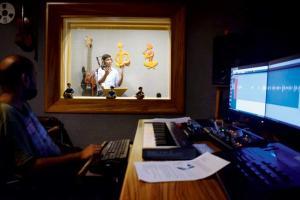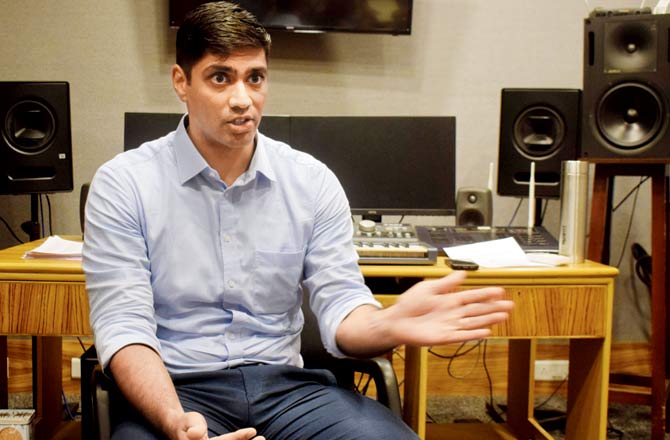Until recently, reading was a singularly solitudinous experience. But curiosity around audiobook apps means that a voiceover artiste like Sidhanta Pinto is reading out everything from Chetan Bhagat to Fali Nariman in a dark room

What's ironical when reading reviews for Ajaya: Roll Of The Dice on Audible, Amazon's audiobook platform launched in India last year, is that users still refer to the experience as 'reading'. One of them says, "must read for all who wants to see the other side of Dharmayudh! (sic)" It's a testament not only to the writing of Ananda Neelakanthan, but also the voice of Siddhanta Pinto, who spent a painstaking 24 hours reading out the book and recording it at his Worli studio, Ofspin Media Friends.
ADVERTISEMENT
In the last one year, Pinto, 40, has recorded 15 books for Audible, ranging from Chetan Bhagat's 2 States to non-fiction titles like Fali S Nariman's The State of The Nation, "which he says gave him great perspective" when Article 370 was abrogated and the state of Jammu and Kashmir was split into two Union Territories. Pinto, who started his career in 2001 at a communications firm, moved to radio in 2003 as a marketing executive, says when he was given his first book to narrate, it was a gig that came from a former student whom he'd taught at a radio course. His reaction was what of any purist: why listen and not read? But, just as Pinto's voice grows into your head 10 minutes into listening Ajaya, the idea of narrating books too has grown on him.
Although a voice over artiste, Pinto admits that his existing skill set had to be tweaked to meet the expectations of those plugging in to hear his voice. A theatre actor, having performed in Alyque Padamsee's Romeo and Juliet and Oliver by Raell Padamsee and Carla Singh, Pinto says narrating a book requires a mind shift. "Your voice has to be pleasant and appealing so that someone can listen to it for 16 hours. You have to let the content be king." In theatre, it's the opposite. "Everything you do must stand out."

Pinto introduced 30 variations in tonality for Ajaya: Roll of Dice. Remembering the different intonations isn't easy. Which is where a sound engineer like Rajesh Ravi steps in. Pics/Ashish Raje
Yet, not all books are the same. If a non-fiction title allows for a single voice, Ajaya required Pinto to introduce 30 variations in tonality. Bheeshma, the eighth son of Kuru King Shantanu and the goddess Ganga, has a baritone, while the young Kaurava and Pandava princes, have voices that have not yet cracked. Kunti screeches (it helps that the book doesn't portray her in great light). Remembering the different intonations isn't easy. Which is where Rajesh Ravi, sound engineer and audio producer at Ofspin, steps in. While Pinto narrates the book and brings out different voices, Ravi marks them on the Cubase software. And, at the next appearance of the character, Ravi points out if the narrator has got it wrong. An hour of content, says Pinto, takes another 30 minutes in post-production. It all finally goes for a quality check and if any changes are required, they are made.
The other direction in which a theatre performance differs from performing a book is preparation. There's no reading up the entire book ahead of a narration, much less memorising it. Pinto sits with his laptop in the recording room and reads from a PDF provided by the publishing? firm. At the max, he reads 10 minutes ahead to familiarise himself with what happens next to get a sense of the character. Does he ever have to interact with the author to confirm a pronunciation or text? "Audible has allowed for that, but it has not been needed yet." If a narrator gets something wrong, they don't stop him/her right there, lest the flow is interrupted. They come back later and fix it. The world of post-production allows for many wonders.
Yet, some of the difficulties that arise are in understanding how to translate a visual—graphics and tables for instance, are common in self-help books—into words. But the app allows readers to download these, too. "Sometimes, the books come to us written badly. We are not sure what to do then, but we have the freedom to correct the grammar," says Pinto, throwing a look at Audible's publicist, wondering if his statement will be redacted. In a market with nearly 30 audiobook apps—some as simple as the books available on Playstore or iTunes, and some that cater specifically to certain genres such as self-help or business—audiobooks look like they have found a market. In fact, in June 2019, the UK publishing industry was hit by a surprise fall of £168 million (5.4 per cent) in sales of physical books last year while audiobook sales surged 43 per cent to £69 million last year, with Amazon's Audible service dominating sales. This, even though a book in audio format is the most expensive. For instance, while the Ajaya comes at a Rs 700, and Becoming for Rs 621.60, their paperback versions cost Rs 220 and Rs 270 each respectively. On Kindle you can buy Ajaya at Rs 114 and Becoming at Rs 378.50.
Today, Pinto also looks for other voices to narrate the books that come to his studio. He auditions three a week. Many come from voice coaching classes. Audiobooks have created a new avenue for people with a talent that may not have had an outlet so far. And, not all are people looking at this as a full-time profession. "One of the best voices we have heard is a senior executive at a city firm. He has a smashing voice and recorded the book in one take. It was unbelievable." Top on Pinto's checklist is fluency in the language. And, who better to read the book than the author themselves? The best job here is Michelle Obama, whose memoir Becoming was published recently and is available in her own voice.
But, performing a book, like any other performance comes with its own share of feedback. Positive and negative. There were quite a few of the latter initially, says Pinto. A Chetan Bhagat book, The Girl In Room 105, not only brought in bad reviews for the author but also had a reviewer headlining it with "bad narration". "Narration was so dumb... hi I said, no she said. A toddler reading a play." Fortunately for the artistes, right below is a remark that reads: "excellent narration" with a "very nice story". But, the best feedback Pinto says is what he got from Neelakantan during the launch of Audible in India last year. "There were a few kiosks where you could plug into the headphones and listen to a given book. I spotted Anand and asked him to listen to the book and stood there as he did. After he heard some four minutes of it, he said 'I am glad it's you who did it'. That was a big moment for me."
60:30
Ratio of time taken for content creation vs post-production in mins
Catch up on all the latest Mumbai news, crime news, current affairs, and also a complete guide on Mumbai from food to things to do and events across the city here. Also download the new mid-day Android and iOS apps to get latest updates
 Subscribe today by clicking the link and stay updated with the latest news!" Click here!
Subscribe today by clicking the link and stay updated with the latest news!" Click here!






